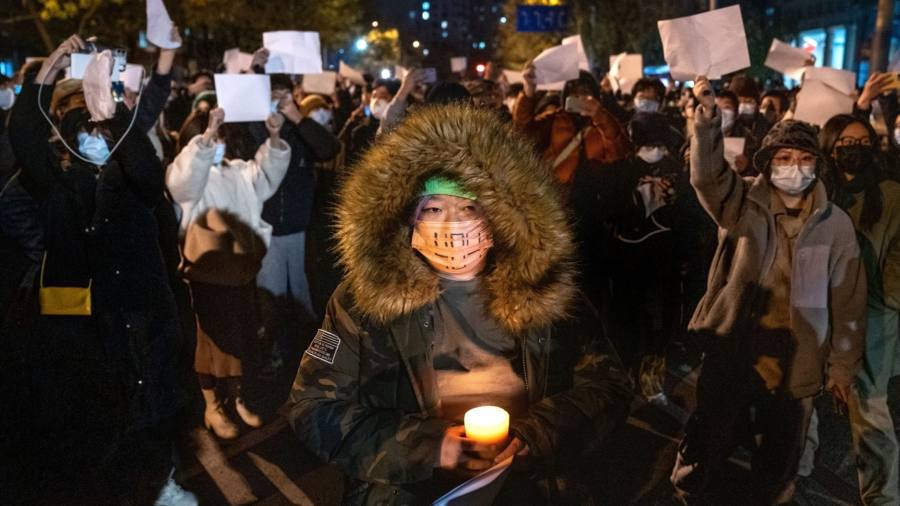[ad_1]
At the bottom of a central Beijing tower block, two dozen of my neighbours stood behind a quarantine line, facing off with the low-level officials and police tasked with enforcing China’s “zero-Covid” policy.
The confrontation was one of many that played out across big Chinese cities at the weekend, as frustration at nearly three years of tough controls erupted into spontaneous resistance.
Everyone in my block had been quarantined inside their flats for nearly a week after one neighbour tested positive for Covid-19. We were on the cusp of being set free when we were told a second case in the building would extend our lockdown for another six days.
“Our goal is conquering the pandemic,” shouted an official, who identified himself as deputy director Zhang from the Liulitun subdistrict office, from one side of the quarantine line on Saturday. “Controlling the pandemic is not something the government can do alone. Government, society, individuals, businesses — we all have responsibilities,” he said.
“We want to be freed!” a neighbour shouted back. “We need to go out to work and make money — you make money while quarantining us,” yelled another.
Other quarantined communities were less restrained. Some smashed down the temporary barricades erected by the authorities around their homes. In the capital Beijing, the financial hub of Shanghai and the central city of Wuhan — where Covid was first identified — frustrations bubbled over into broader protests against President Xi Jinping and the ruling Communist party.
This grassroots defiance poses a grave challenge to Xi’s zero-Covid doctrine. The policy has been bolstered by the creation of an elaborate system of technological and societal controls that help the authorities trace and eliminate outbreaks. But it still requires citizens’ compliance to function. China’s cabinet eased some Covid controls this month while retaining the overarching goal of eradication. But the looser controls have made it even more difficult to eliminate the disease.
Officials have so far resisted putting Beijing into full lockdown, but normal life has come to standstill. Restaurants, schools and most other public buildings have been shuttered and hundreds of communities like mine put into quarantine. Meanwhile the virus continues to spread, with more than 8,000 new cases reported over the weekend.
The protest at my building in Liulitun, part of the bustling Chaoyang district, flared after we had been stuck in our flats for six days, relying on food ferried to our doors by men wearing white protective suits, goggles and respirators. The elevators were turned off and entrances chained shut, aside from a single door blocked by a security guard. A police car was parked outside.
The neighbourhood committee’s notice on Saturday morning extending the quarantine provoked immediate fury. This organisation technically represents residents’ interests, but in practice it is akin to the lowest level of government in China and responsible for implementing day-to-day Covid policies.
“We have the right to know what’s going on!” wrote one neighbour in the building’s WeChat group. One neighbour started a virtual petition for residents to sign demanding more information, then another started a second petition calling for all of us to venture downstairs at noon. We added our apartment number to both.
“When the time to defend our rights comes, we have to defend them . . . we are humans,” said one resident. Reports of locked-down blocks winning their freedom had already begun spreading over social media despite attempts to censor them. The emerging protest playbook called for nonviolent resistance — demands to see the stamped document authorising the building’s lockdown coupled with repeated calls to the local police.
At noon on Saturday, two dozen of our block’s largely middle-class residents pushed past the security guard to congregate in the lobby, inside the quarantine line. The group included several mothers and fathers, one young couple and a few grandparents. A dozen staff from the neighbourhood committee and police stood on the other side of the line blocking the exit.
A shouting match erupted. Residents demanded to see evidence of the building’s Covid cases and the government’s quarantine orders. The lead police officer fidgeted with his watch, clearly uncomfortable with being forced into officiating a zero-Covid stand-off.
Residents demanded he judge if the quarantine amounted to their unlawful jailing. “Right now this is a locked-down building, if you come past this line I will have to block you,” he responded.
After an hour of heated debate, deputy director Zhang arrived. He stands one level of government above the neighbourhood committee and promised to report residents’ demands to his superiors. He indicated the building might be set free the following day if the latest batch of Covid tests were all negative.
Residents returned to their homes, planning another protest for Sunday morning. But before it could start the WeChat group began to ping with new messages. “[They] are taking down the quarantine line,” one neighbour texted. Another simply read: “We’re free, we’re free”.
Residents who live close to the latest Covid case must remain quarantined until December 3 — we are still unsure why the rest of the building has been set free. For now, we remain on Beijing’s list of “high-risk areas”, watching warily for the police car to return.
[ad_2]
Image and article originally from www.ft.com. Read the original article here.

